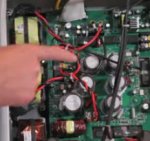A consumer watchdog organisation in South Australia states it is receiving dozens of phone calls a week from disgruntled owners of solar power systems who have discovered their systems feature low quality inverters.
When buying a solar power system, much of the purchaser’s attention can be focused on the solar panels; but a critical component often overlooked is the inverter.
In a grid-connected home solar power system, DC electricity produced by the rooftop modules is first routed into the solar inverter, which converts the current to 240 volts AC, the same as household’s mains supply. The solar inverter also feeds surplus electricity generated by the system into the mains grid.
Just like a chain is only as strong as its weakest link; poor quality inverters can impact heavily on the performance of solar power systems; tend to have a high failure rate and may pose an electrical safety threat.
To help raise awareness of the problem, national solar provider Energy Matters last month released a video demonstrating why all solar inverters are not equal.
According to a report on AdelaideNow, Consumer SA spokesman David Schomburgk said the number of complaints the group is receiving could be the “tip of the iceberg”. A symptom of a shoddy or faulty inverter may be where a household’s energy use doesn’t change after installing a system, but the expected electricity bill savings are not achieved.
Inverters represent a significant part of the cost of a system and with consumer attention often on the solar panels in a package, some providers are cutting corners on inverter quality in order to boost profits and/or reduce system prices.
While shoddy solar inverters may feature the same duration of warranty as their higher quality counterparts; the inconvenience of making a warranty claim should be considered when making a purchase decision; as should the scenario of the inverter manufacturer or retailer disappearing – making a warranty claim even more difficult.
Related:







































